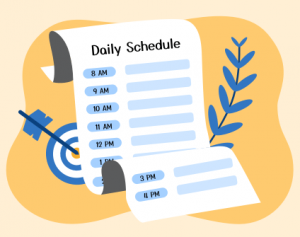As we navigate through what author Douglas Rushkoff calls “present shock,” where we’re constantly bombarded with information and demands on our attention, the need for efficient scheduling and task management has reached new heights. This blog offers practical strategies to optimize your daily schedule using Planndu. By mastering the art of to-do lists, task prioritization, and deadline setting, you can take control of your time and boost your productivity in today’s demanding world.
The Evolution of Scheduling
Before we dive into practical tips, it’s fascinating to consider how our relationship with time has evolved. In his book “A Geography of Time,” social psychologist Robert Levine explores how different cultures perceive and use time. He notes that while ancient civilizations relied on natural cycles for timekeeping, the Industrial Revolution brought about a shift towards clock time, fundamentally changing how we structure our days.
Today, we find ourselves in what author Douglas Rushkoff calls “present shock” in his book of the same name. We’re constantly bombarded with information and demands on our attention, making effective scheduling more important than ever.

Developing an Effective To-Do List
Building a To-Do List
We understand the power of a well-structured to-do list in improving productivity and achieving goals. Planndu is designed to help you organize tasks and objectives effectively, providing clarity on priorities and maintaining focus on essential matters.
A thoughtfully constructed list aids in time management by optimizing resource allocation and preventing overcommitment. Many users find that the act of listing tasks provides mental clarity and alleviates anxiety, allowing for improved concentration on execution.
Here are some best practices for creating an impactful task list, which are easily implemented with Planndu:
– Weekly Planning: Begin each week by outlining key tasks for the coming days. This provides a foundation for daily planning. Many find that setting aside time on Sunday evening to plan the week gives a sense of control and reduces anxiety about the workload.
– Maintain Flexibility: Understand that your list is adaptable. Add items as they arise and be open to adjustments as needed. Embracing flexibility often leads to increased productivity and less frustration when plans change.
– Task Specificity: Define tasks with precision. Instead of broad entries like “work on the project,” specify actionable steps such as “conduct market research” or “draft project proposal.” Breaking down larger tasks into specific, manageable steps can help overcome procrastination and increase a sense of accomplishment.
– Use Time Blocks: Allocate dedicated periods for specific tasks. This technique can enhance focus and productivity, allowing for full immersion in a task without constant distractions.
– Align with Energy Levels: Schedule demanding tasks during your peak energy hours and reserve simpler tasks for lower-energy periods. Tackling challenging work during the most productive hours can significantly improve overall productivity and job satisfaction.

Prioritize Tasks
At Planndu, we understand that prioritizing tasks is a crucial step in making your to-do list manageable and focusing on what truly matters. That’s why we’ve integrated a robust prioritization system directly into our platform. With Planndu, you can easily categorize your tasks as critical, high, medium, or low priority, providing you with a clear view of what to address next and when.
Our priority feature is inspired by productivity tools like the Eisenhower Matrix, which categorizes tasks based on urgency and importance. This method, now seamlessly incorporated into Planndu, helps you distinguish between tasks that require immediate attention and those that can be scheduled or delegated.
To help you make the most of Planndu’s prioritization feature, consider these questions when assigning priorities:
– Which tasks have flexible deadlines that can be delayed without consequences?
– What tasks have the potential to make the most significant impact on your goals or projects?
– Are there tasks that are dependent on others being completed first?
– Can certain tasks be delegated to others?
– Which tasks are you most motivated to handle right now?

Set Deadlines and Reminders
At Planndu, we believe that effective task management extends far beyond simple prioritization. Our users have discovered that setting approximate deadlines for each task is a game-changer in optimizing their time. While pinpoint precision isn’t always necessary, these deadlines provide clarity about task importance and work capacity. We’ve designed Planndu to make deadline-setting a breeze – even when you’re unsure about a specific timeframe, you can easily set a tentative deadline and revisit it later. By ensuring every item on your to-do list has a defined timeframe, you’ll experience a new level of organization and enjoy a clear daily roadmap.
One of Planndu’s most loved features is our robust system for recurring reminders. Our users rave about how this functionality has transformed their daily routines, especially for managing regularly repeating tasks. With Planndu, you can effortlessly set reminders and due dates for everything from weekly team meetings to monthly report submissions. Our time-tracking capabilities enable you to allocate your hours more effectively and consistently meet your deadlines.

Adapting to Change
When it comes to efficient time management, the ability to handle and adapt to changes is of paramount importance. Once you thoroughly understand your daily plan, it’s time to begin your work. It’s crucial to keep in mind that your schedule can change during the day due to deadlines, and sometimes you may need to reschedule your weekly appointments or meetings.
To simplify dealing with these unexpected changes, consider eliminating less essential tasks from your schedule. It will provide more flexibility for tasks that might require more time than initially anticipated. Using Planndu can assist you in quickly and effortlessly adjusting your plan with just a tap, reducing the stress associated with staying on top of your responsibilities, which can evolve throughout the day.

Effective time management is a skill that has evolved alongside human civilization, adapting to the changing demands of our world. The goal isn’t just to be busier, but to be more productive and fulfilled in both your personal and professional life. Try these techniques with Planndu as your ally, and you’ll find yourself not just managing time, but mastering it. Start your journey towards optimal time management with Planndu now!




